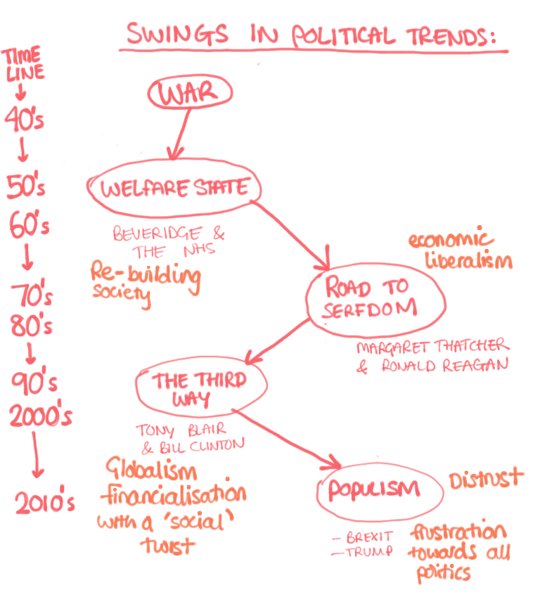Modern politics feels really scary sometimes; there’s so much anger and hate. Big changes in our systems are always scary. This post is about why what’s happening now is not necessarily worse than what’s been happening over the last 80 years. Zooming out and looking at the big picture of political shifts is comforting; We see how big changes are normal and it’s empowering to remember that things do change. We can focus, instead, on considering: ‘how should they change?’.
Why politics isn’t really scary
It’s cool to look at the big political shifts in the 1900’s. Everything always looks different with hindsight. Zooming out on the big picture of politics over the last 100 years makes todays political horrors seem more manageable and understandable. It makes me realise the dramas of today’s politics will be a paragraph in a text book one day, and somehow it leaves space to think about the bigger picture rather than getting frustrated by the detail.

This post swiftly explores the political shifts of the last ~100 years in 4 main steps:
- Welfare and Beveridge (The NHS)
- The road to serfdom ‘economic liberalism’ (Margaret Thatcher and Ronald Reagan)
- The third way and global financialisaton (Tony Blair and Bill Clinton)
- Populism and distrust (Brexit, Trump)

These political shifts are closely linked with views during those times on globalism and markets. Some people day that with hing sight, these shifts were inevitable. But there is more to it than that.
A quick pre-cursor
The 1800s was the industrial revolution in Britain; this was the transition to massive production sales in huge factories powered by steam. Workers were paid next to nothing, child labour was huge. Those who weren’t able to work were pushed onto the street into slum-like living. The poorest of the poor joined them and the close living conditions and terrible hygiene. The lack of sewer systems and freshwater lead to mass illness.
The Fabian society was a communist think tank set up in the 1800s with very ‘progressive’ thoughts on poverty. Beatrice Webb published a famous report in 1909. Her ‘the Minority report’ supported a minimum standard of living; care for the sick, food for the young to prevent malnourishment. Jobs available for those of a working age, a generally more secure livelihood.
Political shift to Beveridge and the welfare state
What was happening in this period? The war has ruined the country and there was a mass effort to invest in the services, in the people, bring people out of poverty and fix the nation. This led to a big welfare state and the National health service.
Key players/publications? The prime minister during the war was the conservative leader Winston Churchill. After the war, a labour prime minister, Clement Atlee, was elected. He based a lot of his campaign off the work of William Beveridge (the founder of the NHS). Beveridge wrote a very famous report in 1942 which set out a new set of rules and order for the UK. National insurance rose and in 1947 the National Health Service was set up. His famous message from the report was to tackle five giants in the pathway to reconstructing post-war Britain: want, disease, ignorance (lack of knowledge), squalor (dirty/in poverty) and Idleness (no motivation). His ideas became widespread across Europe and countries that once existed in the British empire; India, Pakistan, the middle east and East Asia.
Political shift to ‘economic liberalism’ (Thatcher’s politics)
What was happening in this period? Some people were skeptical of the ‘Interventionalist state’ introduced by the Fabian society and then the post war national and welfare states that were emerging. They worried the interventionalist state would lead the countries towards a position where the governments had so much power they became an opposing force. They feared the whole of society would be doomed to serving them forever. In this period, what’s called “classical economic liberalism” emerged. The idea was that individuals should have the highest level of individual liberty (while living in societies). Governments should not be in control of wealth and money and skills and education. Instead, financial markets should be the driving forces behind these things. Financial market could be more efficient as picking out the absolute best services/industries by only rewarding businesses and operations that worked in the most profitable way.
Big people/names and publications? The main thinker behind this philosophy is called Friedreich Hayek. He published a very famous book in 1944 called “Road to Serfdom”. He later moved to Chicago and part-founded a the very famous ‘Chicago school of economic liberalism and lazzei-faire economics’ that promoted his economic theories. It gained a lot of traction. His ideas were used to form the politics of US president Ronald Regan (In office 1981-1989) and UK Prime minister Margaret Thatcher (who was prime minister 1979-1990).
Thatchers policies included reversing high inflation after the war, de-regulating the financial sector (reducing the amount of government regulation over their actions), privatising state-owned businesses, and taking power away from trade unions. In other words less of a safety net, less protection from the state and more quick movement along with financial markets. The government have less influence or control.
Political shift: The third way and global financialization
What was happening in this period? As the popularity of the Regan Thatcher years began to decrease a new idea of how things could be done came about. It came from people who had once been leftist and opposed the right wing, free economy policies in the 80s. The ideas was that since markets were now free to increase rapidly (and globalisation had already started), the government should jump on the bandwagon and use globalisation to its advantage. They’d support big financial institutions and use the money these institutions brought into the country to create more generous social policies. They were mixing financialization with left wing principles of investing in education, healthcare and a strong welfare state.
The ideas became very popular. It was called the ‘third way‘. The ideas were catching on in countries all over the world. Since every country wanted to attract big business and have them profit most in their own country (along with the money they brought in) a race began for the most competitive environment for business. Allowing financial loopholes and reducing corporation taxes would make a country more competitive against other countries as a place for big business to set up and flourish. The more they quietly allowed businesses to get away with, the better the relationship with business became. Although these were usually centre-left political parties, they became better friends with ‘business’ that left-leaning parties had ever been before.
Who was doing this? Tony Blair in the UK, Bill Clinton in the US and many similar leaders around the world at that time.
until the financial crash…
This seemed to work up until the financial crash in 2008. The crash came about because the financial services industries, which were very unregulated, began lending money irresponsibly and selling products, that were not backed up. The risks rose and spiralled out of control and this made the whole system unstable. Eventually a few companies failing (which would have been no big problem if the rest of the industry was strong and backed up and healthy) caused a gigantic domino effect crash. The banks failed and the tax payer had to foot the bill. As well as huge anger at how unfair this is, thousands of people suffered really hard times from no jobs or money because of the the crash.
Political shift to populism and distrust
What was going on at the time? Following the financial crash a lot of jobs were lost a lot of money disappeared and people faced hard times. There was a lot of social dissatisfaction, not just at economics, but also from change in the type of work available as a result of the technological revolution, globalisation and social factors like immigration.
Lots of traditionally working class workers who would have benefitted economically benefit from a left-wing government felt a lot of dissatisfaction and distrust towards the establishment. Many felt ‘left-behind’ of ‘stuck’ by the changes in work values, and social culture around them. Because of this, they sided more with frustration at change in what was publicly valued that they voted in solidarity with their value system rather than the economics that would most benefit them.
Who were the key player? The Brexit vote and Trumps election in 2015 are two big examples of that. It’s a closer to current day effect and needs more careful exploring so there is a separate post – why the rise in populism?
Overview: what we take form these political shifts
So what can we take from looking at these political shifts? Well, I think an overview is reassuring because it shows that change does happen. Also that change will continue to happen. So in a sense, it’s inspiring- some of these political shifts were really big. What do we want the next big shift to be? Climate action, social inclusion, dismantling of current financial systems?
This was a long post- thank you for reading!
We are creating a community to engage in understanding the systems in our world and working towards a fairer, kinder, sustainable future. Join our monthly mailing list to become part of it and hear about what’s been published on the site and what is going on at Leg Up Understanding.
We have posts on politics, economics, environment and society– check out some of our other work!

